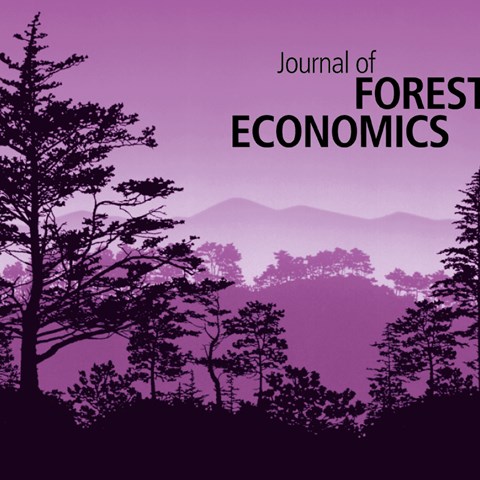Fakta:
Lintunen, J. and Uusivuori, J. (2016) On the economics of forests and climate change: Deriving optimal policies. Journal of Forest Economics 24, 130-156
Kontakt
Ola Carlén, ola.carlen@slu.se, 090-7868423, 070-203 32 42

Jussi Lintunen och Jussi Uusivuori visar i sin prisvinnande artikel att det är optimalt att användningen av trä ökar trots att det inte är utsläppsfritt. Däremot blir detta endast sant om virkesförrådet först ökar. Bidrag för skogstillväxt och skatt på uttag kommer leda till att skogsägare skjuter på avverkningen vilket i sin tur ökar virkesförråd och kolinlagring. När omloppstiden nått sin hållbarhetstopp kommer utfallet från avverkningen öka och priset på rundvirke minska vilket innebär att det kan bli optimalt att använda rundvirket för att generera energi.
While the importance of forests in combatting climate change has long been acknowledged, it has come under serious debate due to concerns regarding the use of forests for energy production. In fact, 6 of the 71 articles published in the 2016 and 2017 issues of the Journal focused on the question of carbon storage and the impact that it can have on policy outcomes. At the stand level, the question of carbon storage has been analyzed through the Hartmann model for internalizing externalities into optimal decisions, but at the broader societal and policy level, the literature is only beginning to deal with the many theoretical and applied questions that forests and climate change pose. Jussi Lintunen and Jussi Uusivuori make a serious contribution to the growing literature by developing a first-best optimal forest sector carbon policy analysis. In this manner, they explicitly evaluate the trade-offs between carbon storage in the forest and the carbon that is released through utilization. This derivation of policy outcomes is an important contribution to the literature and led to its recognition for this year's Soren Wibe prize.
In their paper, Lintunen and Uusivuori use a forest and energy sector model with a carbon cycle module to show that renewability and carbon neutrality arguments do not necessarily warrant an emission-free status for wood use. They specify a model economy and couple it with a carbon cycle module including forest biomass in its multiple forms. They then solve for the competitive equilibrium with carbon externalities by optimizing the use of forest biomass when the costs and benefits of carbon flows are determined by the social cost of carbon. Their results show that an optimal policy subsidizes the production of wood products for their carbon sequestration. Correspondingly, carbon removals by biomass growth are subsidized and the harvest residue generation taxed. They provide a numerical solution of the model shows that, although the use of wood is not emission free, it is optimal to increase the use of wood, possibly also in the energy sector. However, before wood use can be increased, forest biomass must first be increased. The development of this carbon sink decreases net emissions until the forest resources reach a new equilibrium.
David Newman
Markku Ollikainen
Jette Bredahl Jacobsen
Sören Wibepriset delas ut vartannat år till en artikel i Journal of Forest Economics de senaste två åren som visat på en påtaglig utveckling av empirisk kunskap eller metod i det skogsekonomiska forskningsområdet. Artikeln väljs ut av en oberoende internationell kommitté bestående av tre experter från forskningsområdena skog- och miljöekonomi. Förutom ett diplom erhåller vinnarna en prissumma om 2000 Euro. Vi tackar Sören Wibes familj och Elsevier vars bidrag har möjliggjort detta pris.
Författarna kommer att bjudas in att besöka Centrum för miljö- och naturresursekonomi (CERE) och en prisceremoni för att hålla ett seminarium med den vinnande artikeln. Datum för detta meddelas senare.
Lintunen, J. and Uusivuori, J. (2016) On the economics of forests and climate change: Deriving optimal policies. Journal of Forest Economics 24, 130-156
Ola Carlén, ola.carlen@slu.se, 090-7868423, 070-203 32 42